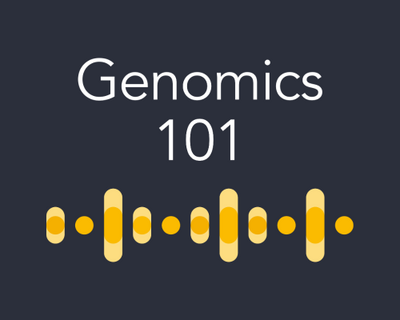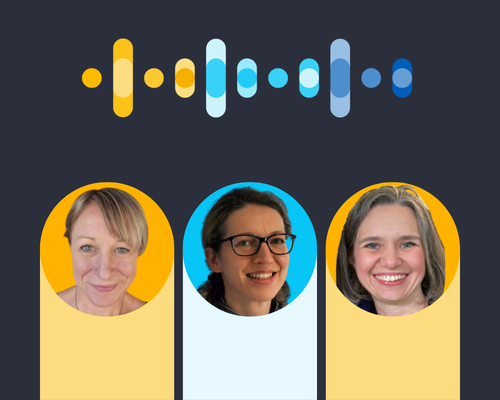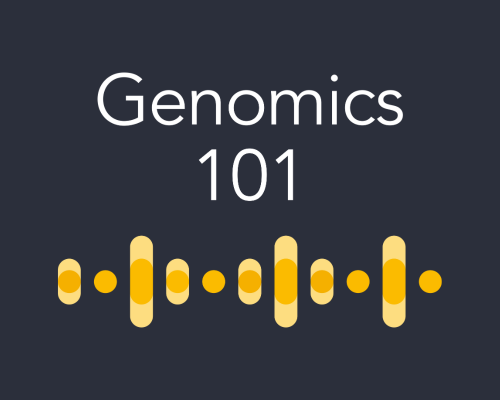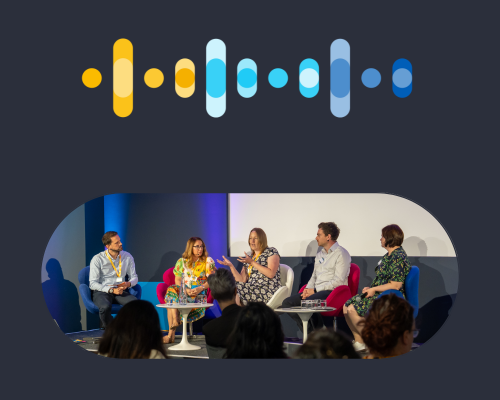
What is a genetic counsellor?
In this explainer episode, we’ve asked Amanda Pichini, clinical director at Genomics England and genetic counsellor, to explain what a genetic counsellor is.
You can also find a series of short videos explaining some of the common terms you might encounter about genomics on our YouTube channel.
If you’ve got any questions, or have any other topics you’d like us to explain, let us know on [email protected].
You can download the transcript or read it below.
Florence: What is a genetic counsellor? I'm Florence Cornish, and today I'm joined with Amanda Pichini, a registered genetic counsellor and clinical director for Genomics England, to find out more.
So, before we dive in, lots of our listeners have probably already heard the term genetic counsellor before, or some people might have even come across them in their healthcare journeys. But for those who aren't familiar, could you explain what we mean by a genetic counsellor?
Amanda: Genetic counsellors are healthcare professionals who have training in clinical genomic medicine and counselling skills. So they help people understand complex information, make informed decisions, and adapt to the impact of genomics on their health and their family. They're expert communicators, patient advocates, and navigators of the ethical issues that genomics and genomic testing could bring.
Florence: Could you maybe give me an example of when somebody might see a genetic counsellor?
Amanda: Yes, and what's fascinating about genetic counselling is that it's relevant to a huge range of conditions, scenarios, or points in a person's life.
Someone's journey might start by going to their GP with a question about their health. Let's say they're concerned about having a strong family history of cancer or heart disease, or perhaps a genetic cause is already known because it's been found in a family member and they want to know if they've inherited that genetic change as well.
Or someone might already be being seen in a specialist service, perhaps their child has been diagnosed with a rare condition. A genetic counsellor can help that family explore the wide-ranging impacts of a diagnosis on theirs and their child's life, how it affects their wider family, what it might mean for future children. You might also see a genetic counsellor in private health centres or fertility clinics, or if you're involved in a research study too.
Florence: And so, could you explain a bit more about the types of things a genetic counsellor does? What does your day-to-day look like, for example?
Amanda: Most genetic counsellors in the UK work in the NHS as part of a team alongside doctors, lab scientists, nurses, midwives, or other healthcare professionals. Their daily tasks include things like analysing a family history, assessing the chance of a person inheriting or passing on a condition, facilitating genetic tests, communicating results, supporting family communication, and managing the psychological, the emotional, the social, and the ethical impacts of genetic risk or results.
My day-to-day is different though. I and many other genetic counsellors have taken their skills to other roles that aren't necessarily in a clinic or seeing individual patients. It might involve educating other healthcare professionals or trainees, running their own research, developing policies, working in a lab, or a health tech company, or in the charity sector.
For me, as Clinical Director at Genomics England, I bring my clinical expertise and experience working in the NHS to the services and programmes that we run, and that helps to make sure that we design, implement, and evaluate what we do safely, and with the needs of patients, the public, and healthcare professionals at the heart of what we do.
My day-to-day involves working with colleagues in tech, design, operations, ethics, communications, and engagement, as well as clinical and scientific experts, to develop and run services like the Generation Study, which is sequencing the genomes of 100,000 newborn babies to see if we can better diagnose and treat children with rare conditions.
Florence: So, I would imagine that one of the biggest challenges of being a genetic counsellor is helping patients to kind of make sense of the complicated test results or information, but without overwhelming them. So how do you balance kind of giving people the scientific facts and all the information they need, but while still supporting them emotionally?
Amanda: This is really at the core of what genetic counsellors can do best, I think. Getting a diagnosis of a rare condition, or finding out about a risk that has a genetic component, can come with a huge range of emotions, whether that's worry, fear, or hope and relief.
It can bring a lot of questions, too. What will this mean for my future or my family's future? What do you know about this condition? What sort of symptoms could I have? What treatments or screening might be available to me? So genetic counsellors are able to navigate all of these different questions and reactions by giving an opportunity for patients and families to discuss their opinions, their experiences, and really trying to get at the core of understanding their values, their culture, their expectations, their concerns, so that they can help that individual make an informed decision that's best for them, help them access the right care and support, adjust or find healthy coping strategies, or maybe even change their lifestyle or health behaviours. So it's really finding that balance between the science, the clinical aspects, the information, and the support.
Florence: So obviously working in this space, I get to read about lots of incredible research all the time, and it feels like genetics and genomics seems to be changing and advancing day by day. So, I'd be interested to know what this means for you and for other genetic counsellors, what's coming next?
Amanda: Yeah, so as we continue to see advances in genetics and genomics, there's, I think, a really increasing need for genetic counselling expertise to help shape how these technologies are used and with giving the right consideration for the challenges around what this means for families and for wider society.
Genomics is also still growing the evidence base it needs to provide a consistent and equitable service. We're seeing digital tools being increasingly available to give people information in innovative ways, seeing huge advancements in targeted treatments and gene therapies, that are changing fundamentally the experiences of people living with rare conditions and cancers. And we're using genomics more and more to predict future health risks and how people might respond to certain medications. So, there's a huge amount that we're seeing sort of coming for the future.
What's interesting is the 10-Year Health Plan that the government has set out for the NHS provides, I think, huge opportunities for genomics. For example, we'll see healthcare brought closer to local communities, genomics being used as part of population health, reaching people closer to where they are and hopefully providing greater access.
But I think the key thing in all of this is knowing that genomics is really just a technology. It requires people with the right skill sets to use it safely and to be able to benefit everyone, and genetic counsellors are a huge part of that.
Florence: And finally, in case anyone listening has been inspired by this conversation and wants to build a career like yours, what advice would you have to offer somebody hoping to become a genetic counsellor in the future?
Amanda: To train as a genetic counsellor in the UK, you usually need an undergrad degree in biological sciences, psychology, or being a nurse or midwife. The background can be varied, but usually driven by a common thread, a desire to sort of improve healthcare experiences for patients and make genomic healthcare widely accessible and safely used for everyone.
You can apply for the 3-year NHS scientist training programme, or there's also master's degrees offered through Cardiff University, for example. In general, I'd encourage people to check out the website for the Association of Genetic Nurses and Counsellors, and reach out to genetic counsellors to ask about their career and their journey as much as possible, as well as seeking opportunities to really understand the experiences of people living with rare genetic conditions, because that will help you understand the ways in which genetic counselling can have an impact.
Florence: We'll finish there. Thank you so much, Amanda, for all of those insights and for explaining what it means to be a genetic counsellor. If any listeners want to hear more explainer episodes like this, you can find them on our website at www.genomicsengland.co.uk or wherever you get your podcasts.
Thank you for listening.


